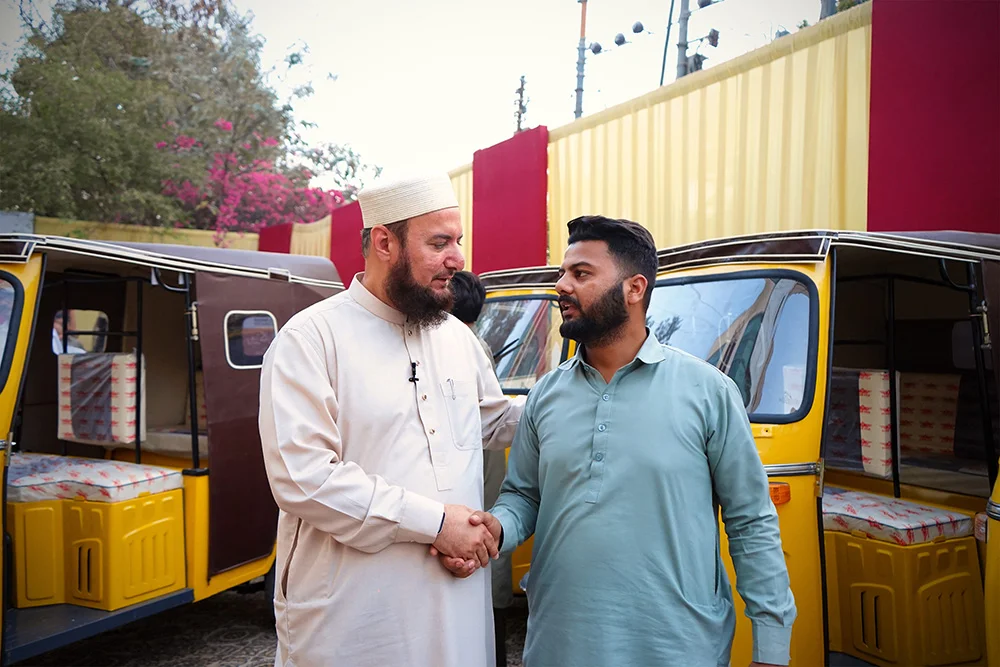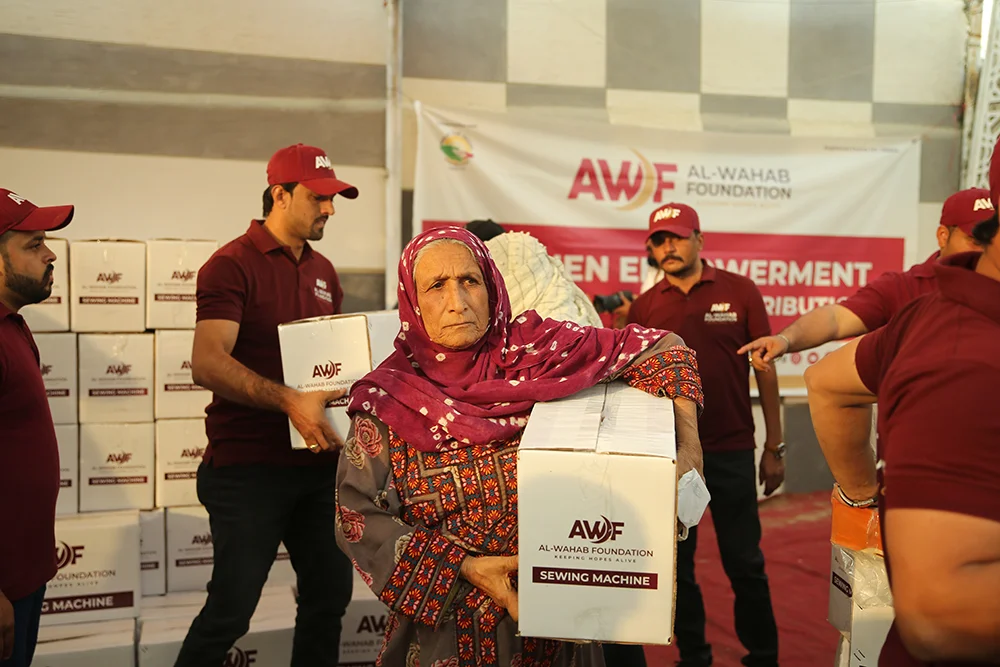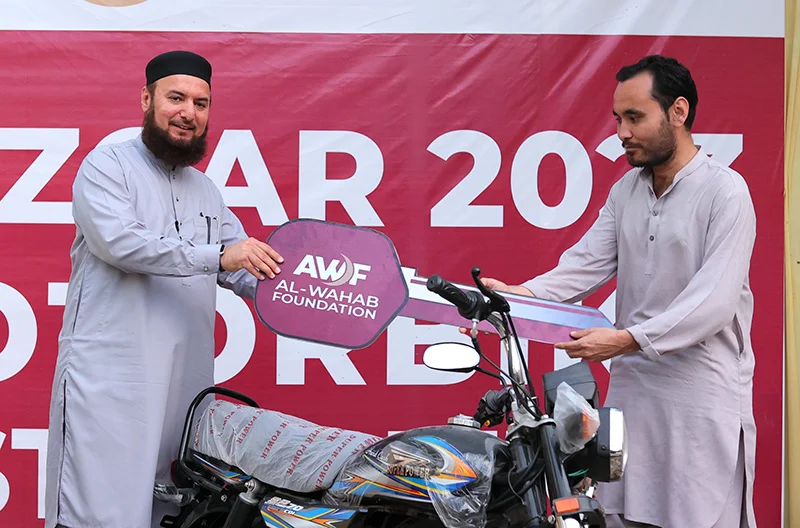Poverty isn’t just about being deprived of financial resources, it’s about the absence of opportunity. In Pakistan, countless individuals continue to face extreme hardship due to prolonged unemployment and rising inflation over the years. Recognising the intensity of this issue, Al-Wahab Foundation responds through its livelihood support program.
For those who inquire about what is livelihood program, it is based on providing rickshaws and sewing machines to food carts and motorbikes, AWF gives deserving individuals the tools to help them earn a sustainable livelihood. Chairman Mufti Abdul Wahab always aims to transform the lives of those who are less fortunate by providing sustainable solutions for their bright future.

What is Livelihood Program at Al-Wahab Foundation?
Al-Wahab Foundation’s livelihood support program is a transformative initiative designed to uplift families and individuals to give them a way out of poverty cycle by providing them tools and resources for self-employment.
As per the vision of Chairman Mufti Abdul Wahab, we provide sustainable income generating solutions instead of offering short-term relief to support families. A Rickshaw can help the deserving individuals considerable income on a daily basis whereas a motorbike can become a source for delivery jobs.
Similarly, providing them with a food cart can help them sell snacks and other items while a sewing machine can empower women with an earning opportunity within the comfort of their homes. Our Rozgar and Women Empowerment Projects focus on providing practical solutions that cater to the needs of the deprived families, ensuring that charity contributed towards this project leads to a better tomorrow.
Help Make a Change Through AWF Rozgar Project 2025
The Rozgar Project 2025 is AWF’s strong commitment to eradicating financial hardship through job creation and small business empowerment. Like every year, AWF is aiming to reach thousands more with life-changing tools like rickshaws, motorbikes, and food carts. Through this initiative, our aim is to help the individuals become self-sufficient and generate income to support their daily needs.
Providing Job Opportunities with AWF Livelihood Support Program
AWF identifies and reaches out to the individuals from low-income households who are ready and willing to work but need support. Our team scrutinises and conducts proper assessment to figure out the most deserving, who then receive motorbikes, rickshaws, food carts, and sewing machines under our Rozgar and Women Empowerment Projects.
Uplifting Women through Sewing Machines
Women are often the most susceptible members of society, especially widows, single mothers, and those who are uneducated. Considering them an equal and most important members of a society, AWF distributes sewing machines to the well deserving women to empower them with a sustainable livelihood, allowing them to work from the safety of their homes. Through this opportunity, women can earn with dignity, independence, and contribute significantly in the household income.

Provide Small Businesses: Make the Communities Independent
Taking transformative measures towards economic development at the grassroots level is essential for long-term change. AWF helps individuals start micro-businesses like small snack carts. These ventures meet local needs while providing stable income for the owners and their families.
Each small business has the potential to support multiple people. It can help one pay their rents, educate their children, and contribute to their daily household expenses. When communities are capable of doing something to make themselves financially stable, they grow stronger and more resilient, even in times of crisis..

Rozgar & Women Empowerment Project Distribution Event
Every year, Chairman AWF Mufti Abdul Wahab himself visits Pakistan for direct distribution of motorbikes, Rickshaws, and Sewing machines under the Rozgar & Women Empowerment Projects.
The event testifies the commitment of Al-Wahab Foundation towards transforming lives and the beneficiaries to do something practical for improving their lives. The beneficiaries from the past years shared how their lives had changed after receiving support through Rozgar and Women Empowerment Projects. These distribution events promote a sense of transparency and community building while encouraging more people to contribute to the cause to change lives.
Creating an Everlasting Impact with AWF Rozgar Project
By addressing unemployment and poverty through practical solutions, Al-Wahab Foundation is creating a long-lasting impact, spanning over generations. Your support can make a father with a food cart can send his children to school. A mother with a sewing machine can contribute to manage household expenses. A young man with a motorbike can earn sufficiently to meet daily needs.
The change isn’t temporary. It will grow over time making the beneficiaries ambassadors of positive change by creating a cycle of generosity for others.
How You Can Contribute to AWF’s Rozgar & Women Empowerment Initiatives?
Your contribution can change a life. Contributing to empowering those who are committed to transforming their lives for a better tomorrow through rickshaws, sewing machines, motorbike, or a food cart, can bring a real change. These acts of kindness directly benefit those who need them most while giving them a chance towards employment, stability, and hope.
Your Sadaqah or Zakat through AWF can also help to uplift the deserving individuals in the years to come.
Frequently Asked Questions
A livelihood project provides practical tools or resources — such as rickshaws or sewing machines — to help people earn their own income and become self-reliant.
The project primarily supports unemployed individuals, widows, orphans’ families, and those from low-income households who have the potential to run a business or service.
By giving women tools like sewing machines, AWF enables them to work from home, earn income, and contribute to household expenses while maintaining family responsibilities.
The project has helped hundreds of families rise above poverty, send their children to school, and build small businesses that contribute to the local economy.
Unlike short-term aid, these projects create ongoing income streams. With tools, training, and local relevance, the support continues to benefit recipients well into the future.

